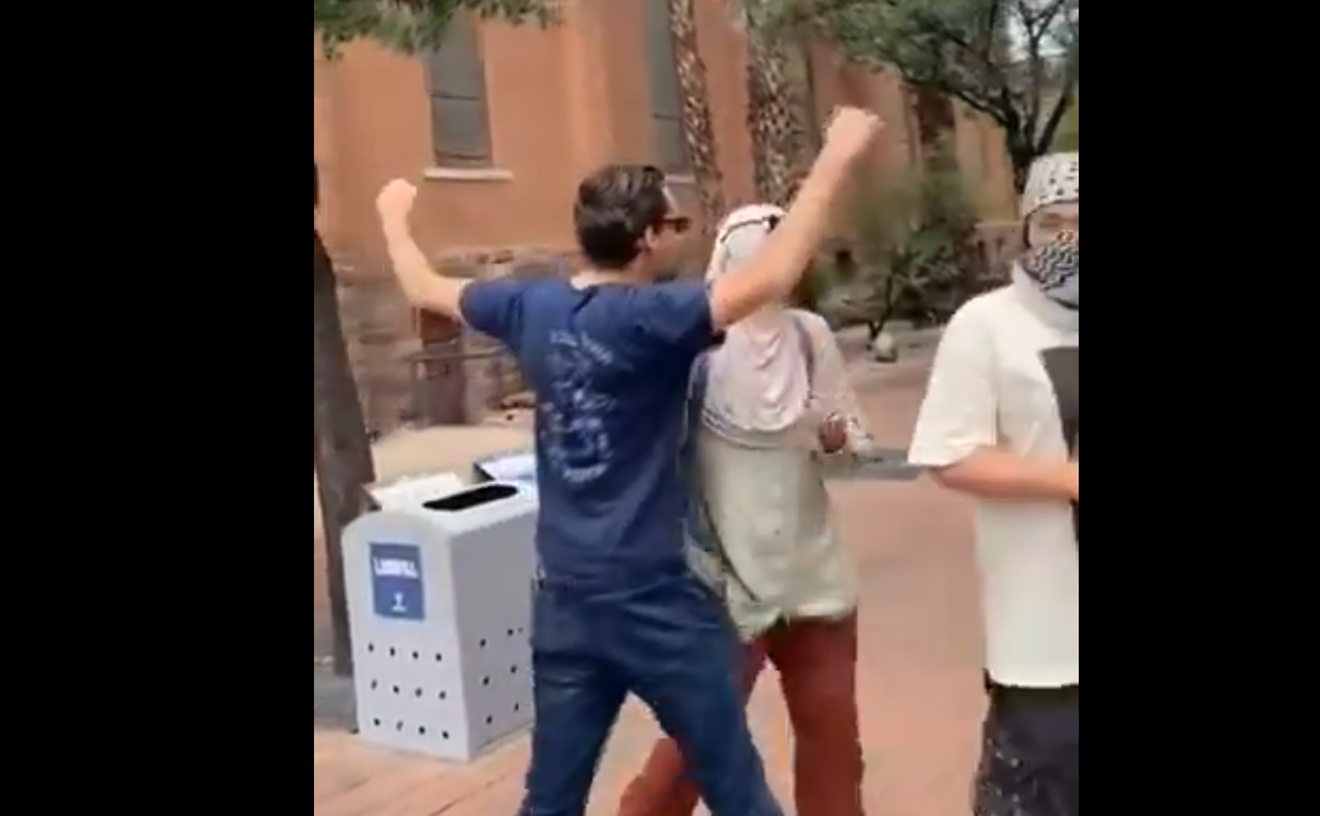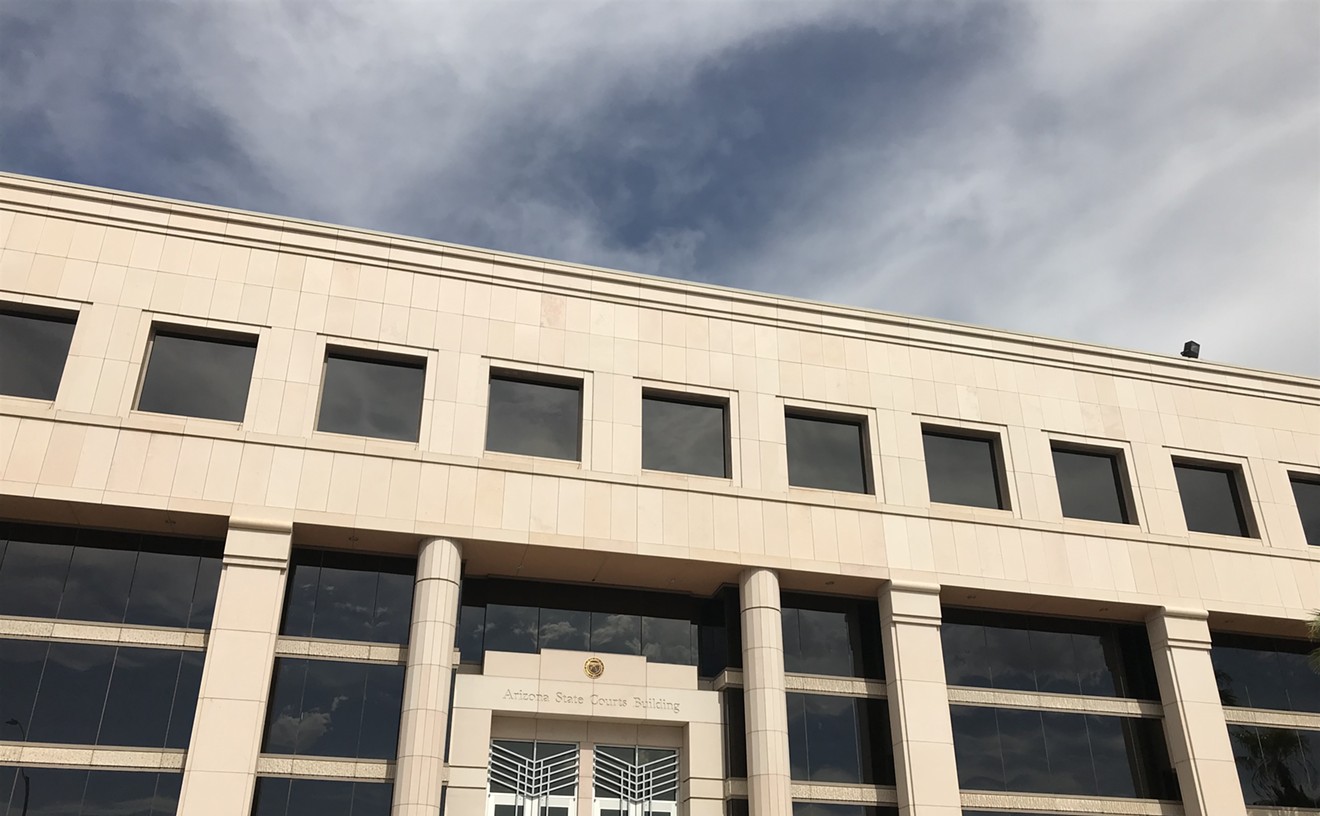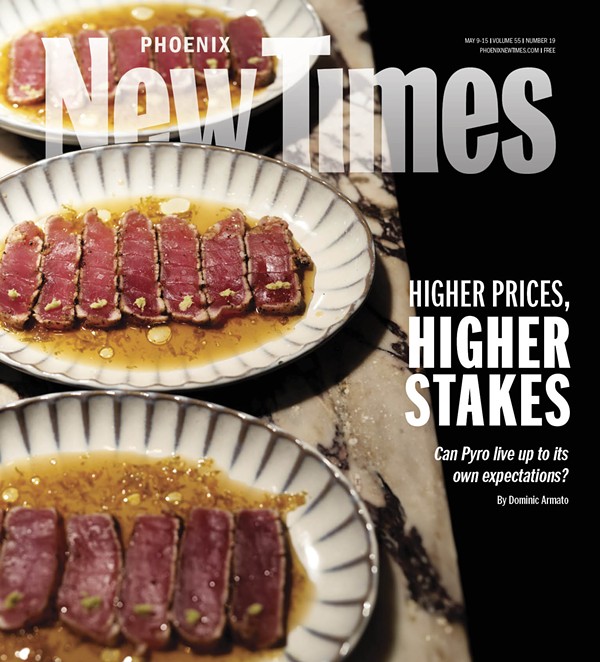Commerce in church: "Sacred Hypocrisy" is a well-written column with a most poignant ending (John Dougherty, March 31). But you seem to miss the point that this is a sacred area -- in effect, a church -- for Native Americans.
The fact that the Snowbowl ski area covers only a small portion of the mountain has nothing to do with the issue.
I'm curious to know how your writer's parents would feel if I wanted to place a small convenience store or maybe a little adult novelty store in the corner of their Methodist church in Fairfax, Virginia. Or how about if I propose a bowling alley be built in front of the Wailing Wall in Jerusalem, or maybe a little disco on the plaza in front of the Vatican?
Richard Mayol, Flagstaff
Not sewage and not the reservation: I just read your piece about the Snowbowl, and I wanted to say: Bravo! I'm glad that someone (particularly from the left) called the Navajos/Hopis on this issue.
The issue of cultural sensitivity for Native Americans regarding the use of reclaimed water seems to be brought up and dropped at the convenience of whatever tribe. I work for a municipality in the Phoenix metro area that utilizes reclaimed water and have dealt with similar issues with the local reservations. The same tribe that will refuse reclaimed water from one municipality will accept it from another as long as a deal can be made.
As for the Snowbowl issue, two things stood out to me:
The San Francisco Peaks are not on reservation land. When Native American communities have rights to their land, they use them very adeptly to prevent certain actions (and rightfully so). This attempt to infringe on land that they don't own seems like an attempt to skirt the rules.
Secondly, I can't help but notice the use of the term "wastewater" in every attempt to describe this situation. This term invokes the image of raw sewage, and, in fact, this is what it means. Reclaimed water is not "wastewater." It is treated effluent, and it is treated to very high standards. It is used throughout Arizona by many rural and metropolitan non-Native American communities for both irrigation and aesthetic purposes. Use of the term to describe reclaimed water is an obvious attempt to cloud the issue.
Name withheld by request
Leave the mountain alone: Oh, come on, yourself! My advice to you is to do some research on Native American history, and not the Anglo view of that history.
You need to educate yourself, because you certainly don't know as much as you think. I also suggest you join an environmental group and learn more about the environment. Your focus seems to be on capitalism and not what is in the best interests of Native Americans. Land is sacred to Native Americans. We have taken almost all that land.
As for the environmental question, wouldn't it be nice if we could just leave the environment as it is and not worry about making more money and having more tourists?
Name withheld by request
What are they afraid of?: Regarding your column on the San Francisco Peaks, I agree with the things you said. Few things that the Navajo and Hopi tribes are against make sense to me.
I am a member of the Navajo Tribe (full blood) and a water and wastewater plant operator for more than 16 years for the U.S. government.
Since tribal presidents are our leaders, they should know the process used to produce recycled water. They should also know that Flagstaff has a state-of-the-art reclamation plant that produces high-quality recycled water.
When I worked at the Grand Canyon for the National Park Service, we produced about a quarter of a million gallons of reclaimed water a day, and most of that high-quality recycled water went into a dry wash and the rest was used for watering the local school's soccer field, the front lawns of lodges and for visitor center bathrooms.
My question is: If the tribal presidents are making this out to be a "genocide" issue, then where is the genocide?
Ray Skeet, via the Internet
Money talks: I find it outrageous that a white writer can go around thinking he knows what's culturally genocidal and what isn't for Native Americans.
Yes, it's a tragedy that Joe Shirley and other indigenous politicians continue to support the destruction of Black Mesa, but that political situation isn't the Native American's game, it's the white man's.
Unfortunately, the Navajo and Hopi tribes are making lots of money off of the destruction of the Dine culture up on Black Mesa. And, like your writer stated, maybe this has an effect on how people view the San Francisco Peaks.
But the leaders of these two tribes aren't the only people opposed to Snowbowl's expansion and use of reclaimed wastewater. Every Native American across this state is opposed to it, as are many outside the state.
Your writer claims that he has two children that he cares about and that reclaimed water has been tested as "safe." Yet the government doesn't feel the need to test the water for possible harmful effects from pharmaceuticals in it.
The writer says expansion of the Snowbowl would make a tubing area for children possible. Yet apparently he doesn't care about the potential health hazards.
Look at the facts. Don't just look at where you want to ski next winter.
Garyn Klasek, Phoenix
"Sacred" means keep off: I am an avid reader of New Times, but I was saddened to see the inconsiderate column about the situation regarding the Snowbowl ski resort and the San Francisco Peaks.
Navajos hold the whole mountain sacred, not just the tip of it. In the Navajo culture, people aren't even supposed to be on the mountain unless it's to gather plants and herbs that would be used in sacred ceremonies.
I want John Dougherty to know that I take my two young daughters to the Peaks to teach them about the sacredness of the mountain and its significance in our culture's traditions. It's hard to explain this sacredness when other Americans use the area for entertainment.
There are other places that Dougherty can go to get entertainment, but there is only one San Francisco Peaks.
Nicholet Deschine, Tempe
CHURCH AND STATE PRESS
Actions of individuals: New Times published a column on March 17 titled "Religious Wrong" (John Dougherty). My understanding is that New Times has taken issue with efforts within the Legislature to censure ASU's State Press for certain controversial articles and photographs found to be in poor taste. Such censure could be effected by a reduction or even elimination of state funding for the paper.
The purpose of this letter is not to weigh in on the issue, per se. Rather, I am concerned that the church I represent, the Church of Jesus Christ of Latter-day Saints, is somehow implied to be behind these actions. New Times fails to separate actions of individuals -- Russell Pearce and Ira Fulton -- from their Mormon church. In fact, the church has neither taken a stand nor suggested to either Mr. Pearce or Mr. Fulton how to posture.
There are several statements in the column that are inaccurate. The column states that "Pearce and Fulton's 175-year-old Church of Jesus Christ of Latter-day Saints has long viewed the separation of church and state as a pesky inconvenience." Further, that the church believes "that the government should be subservient to the church." The opposite is true. From the beginning, the church has gone on record to establish that church members should be law-abiding and allegiant to their government. The church's founder, Joseph Smith, wrote: "We believe in being subject to kings, presidents, rulers and magistrates, in obeying, honoring, and sustaining the law." In every election year, the First Presidency of the church issues a statement to its members about the importance of political neutrality. For example, the church does not endorse individual candidates.
I am sure that New Times wants to assure journalistic integrity. I hope that future articles about our church are factual and reflect fair play. Further, I trust that one's personal beliefs and opinions are separated from the formal organization to which they belong.
Don A. Evans, Arizona spokesman, Church of Jesus Christ of Latter-day Saints










